七年级下册英语语法与习题
人教版七年级下册英语语法练习题整理归纳
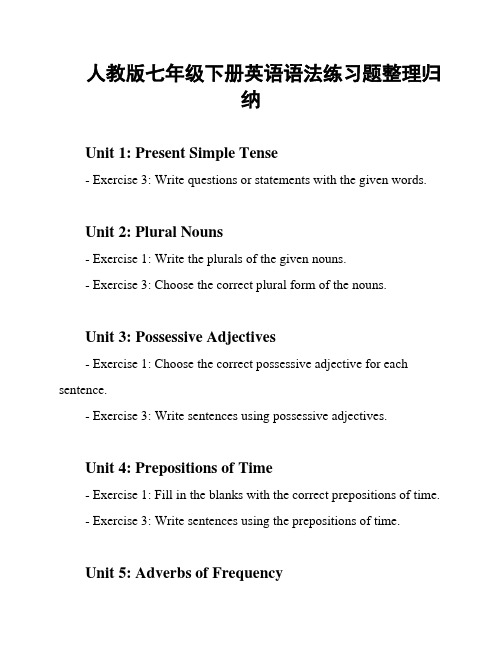
人教版七年级下册英语语法练习题整理归纳Unit 1: Present Simple Tense- Exercise 3: Write questions or statements with the given words.Unit 2: Plural Nouns- Exercise 1: Write the plurals of the given nouns.- Exercise 3: Choose the correct plural form of the nouns.Unit 3: Possessive Adjectives- Exercise 1: Choose the correct possessive adjective for each sentence.- Exercise 3: Write sentences using possessive adjectives.Unit 4: Prepositions of Time- Exercise 1: Fill in the blanks with the correct prepositions of time.- Exercise 3: Write sentences using the prepositions of time.Unit 5: Adverbs of Frequency- Exercise 1: Choose the correct adverb of frequency for each sentence.- Exercise 3: Write sentences using adverbs of frequency.Unit 7: Present Continuous Tense- Exercise 3: Write questions or statements with the given words.Unit 8: Adjectives- Exercise 3: Write sentences using adjectives.Unit 9: Countable and Uncountable Nouns- Exercise 1: Fill in the blanks with the correct form of the nouns in brackets.- Exercise 3: Write sentences using countable and uncountable nouns.Unit 10: Imperatives- Exercise 2: Rewrite the sentences using imperatives.- Exercise 3: Write instructions using imperatives.Unit 11: Simple Past Tense- Exercise 3: Write questions or statements with the given words.Unit 12: Possessive Pronouns- Exercise 3: Write sentences using possessive pronouns.Unit 13: Prepositions of Place- Exercise 1: Fill in the blanks with the correct prepositions of place.- Exercise 3: Write sentences using the prepositions of place.Unit 14: Adverbs of Manner- Exercise 1: Choose the correct adverb of manner for each sentence.- Exercise 3: Write sentences using adverbs of manner.Unit 16: Future Time- Exercise 1: Fill in the blanks with the correct form of the verbs in brackets.- Exercise 3: Write questions or statements with the given words.Unit 17: Indirect Questions- Exercise 1: Rewrite the sentences as indirect questions.- Exercise 3: Write sentences using indirect questions.Unit 18: Past Continuous Tense- Exercise 3: Write questions or statements with the given words.Unit 19: Adjectives and Adverbs- Exercise 1: Choose the correct form of the adjectives or adverbs in brackets.- Exercise 3: Write sentences using adjectives and adverbs.Unit 20: Modal Verbs- Exercise 3: Write sentences using modal verbs.。
七年级下英语常用语法知识——祈使句经典复习题(含答案)

一、选择题1.—Could I smoke here?—____. Look at the sign” No smoking!”A.Yes, you may. B.Of course you can.C.No, you can’t.D.No, you couldn’t.C解析:C【解析】【分析】【详解】句意:——我能在这里吸烟吗?——不,你不能。
看那个标志“禁止吸烟”。
考查情景交际。
Yes, you may.是的,你可以;Of course, you can.你当然能;No, you can’t.不,你不能;No, you couldn’t.不,你不能。
根据句意…the sign “No smoking”可知答案应为否定的,排除A和B。
对话中用Could表示委婉的语气,答语中应用can,故应选C。
2.—________ the population of your town?—About thirty thousand.A.What are B.How much is C.How many are D.What’s D解析:D【解析】【分析】【详解】句意:——你的城市的人口有多少?——大约三万。
考查疑问词辨析及主谓一致。
What are是什么;How much is是多少;How many are是多少;What’s是什么。
首先询问人口有多少应用疑问词What或者How large,而不是How many, How much,故排除B和C;这句话的主语中心词是population,表示抽象意义的“人口”,动词用单数,故选D。
3.They like playing football, ________?A.do they B.don’t they C.aren’t they D.are they B解析:B【解析】【分析】【详解】句意:他们喜欢踢足球,不是吗?考查反意疑问句。
do they是吗?don’t they不是吗;aren’t they他们不是吗?are they他们是吗?反意疑问词由陈述句+简短问句构成,注意“前肯后否,前否后肯”的原则,该题中陈述句是肯定的,因此反意疑问句用否定的,排除A和D;谓语动词like是实意动词,反意疑问句用助动词do构成。
七年级下册一般过去时讲解及练习题

辅导科目:英语授课主题语法:一般过去时教学目标1、熟悉一般过去时的基本结构2、运用概念和结构去解题教学内容经典句型—How was your weekend?—Great,thanks.—What did you do last weekend?-I did my homework.Section A1。
表示“发生在过去的动作",要用一般过去时,句中常含表示“过去"的时间。
一般过去时的结构:主语+V过去式。
翻译时加上“…了”。
(不管主语是“单数”还是“复数”,动词始终用“过去式”)练:(1) He _________ (go)to school on foot yesterday。
(2)– What did Jim do?—— He _________ (go) to the movies。
(3)We ___________ (not go) to the cinema last Sunday。
2. –你上个周末做了什么?—— What did you do last weekend?(did引导,动词还原)——在星期天上午,我打了网球。
—- I played tennis on Sunday morning。
拓展:时间前的介词用什么在上午/下午/晚上:in the morning/afternoon/evening在星期天上午/下午/晚上:on Sunday morning/afternoon/evening在上个星期天上午: / last Sunday morning (前不用冠词)在上学的白天/晚上:on school days/nightson weekends 在周末on weekdays 在工作日3. –Tina的周末怎么样?-- How was Tina’s weekend?--它很棒:It was great。
–它还不错:It was not bad。
–它很糟糕:It was terrible。
11.人教版七年级下册语法专项练习题一(一般现在时,一般过去式,现在进行时)
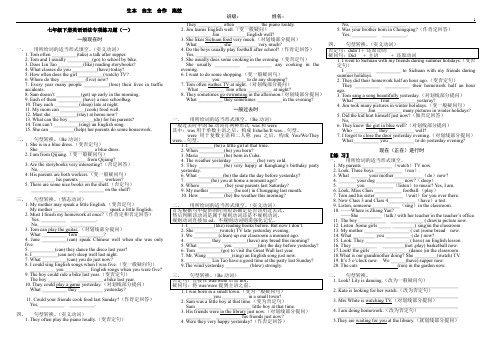
七年级下册英语语法专项练习题(一)一般现在时一、用所给词的适当形式填空。
(实义动词)1. Tom often __________(take) a talk after supper.2. Tom and I usually __________(go) to school by bike.3. Does Lin Tao __________(like) reading storybooks?4. What classes do you __________(have) today?5. How often does the girl __________(watch) TV?6. Where do they __________(live) now?7. Every year many people __________(lose) their lives in trafficaccidents.8. Sam doesn’t __________(get) up early in the morning.9. Each of them __________(have) a nice schoolbag.10. They each __________(sleep) late at night.11. My mom can __________(cook) food well.12. Must she __________(stay) at home now?13. What can the boy __________(do) for his parents?14. Tom can’t __________(sing) an English song.15. She can __________(help) her parents do some housework.二、句型转换。
(Be动词)1. She is in a blue dress.(变否定句)She __________ __________ a blue dress.2. I am from Qijiang.(变一般疑问句)__________ __________ from Qijiang?3. Are the storybooks very interesting?(否定回答)No, __________ __________.4. His parents are both workers.(变一般疑问句)__________ his parents __________ workers?5. There are some nice books on the shelf.(否定句)__________ _____ __________ on the shelf?三、句型转换。
初中英语人教新目标七年级下册Unit4 语法练习(祈使句的用法)(附参考答案)
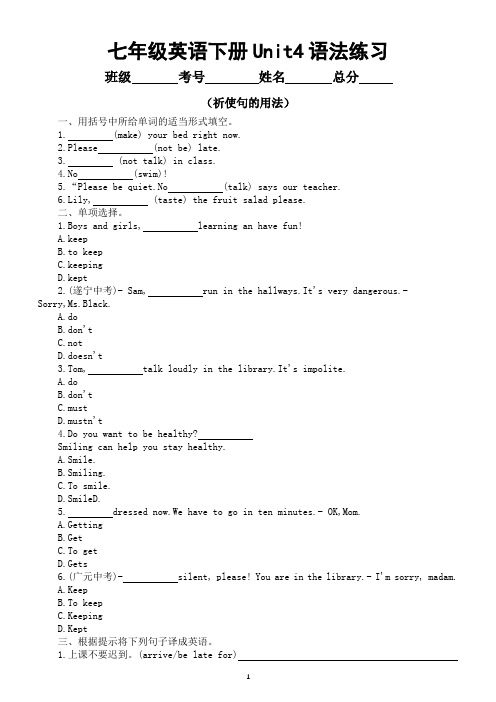
七年级英语下册Unit4语法练习班级考号姓名总分(祈使句的用法)一、用括号中所给单词的适当形式填空。
1. (make) your bed right now.2.Please (not be) late.3. (not talk) in class.4.No (swim)!5.“Please be quiet.No (talk) says our teacher.6.Lily, (taste) the fruit salad please.二、单项选择。
1.Boys and girls, learning an have fun!A.keepB.to keepC.keepingD.kept2.(遂宁中考)- Sam, run in the hallways.It's very dangerous.-Sorry,Ms.Black.A.doB.don'tC.notD.doesn't3.Tom, talk loudly in the library.It's impolite.A.doB.don'tC.mustD.mustn't4.Do you want to be healthy?Smiling can help you stay healthy.A.Smile.B.Smiling.C.To smile.D.SmileD.5. dressed now.We have to go in ten minutes.- OK,Mom.A.GettingB.GetC.To getD.Gets6.(广元中考)- silent, please! You are in the library.- I'm sorry, madam.A.KeepB.To keepC.KeepingD.Kept三、根据提示将下列句子译成英语。
1.上课不要迟到。
(arrive/be late for)2.孩子们,到这儿来。
七年级英语下册语法复习题

七年级英语下册语法复习题七年级下册期末英语语法复习题一、选择填空。
(10分)( ) 1. My brother likes to ______ black shirts.A. inB. put onC. putD. wear( ) 2. They are going to ______ a birthday party for me.A. getB. hasC. haveD. having( ) 3. Today is my brother’s______ birthday.A. sevenB. seventhC. the seventhD. a seventh( ) 4. How are you planning _______ it?A. celebrateB. to celebrateC. celebratesD. celebrating ( ) 5. My friend was born _______ April 5,1990. A. in B. at C. on D. for ( ) 6.. -What’s the shape of the eraser? -It’s_______.A. redB. squareC. blackD. big( ) 7. Did you_____ TV last night A. watched B.watches C. watch D. watching( ) 8. The weather in Beijing is better than___.A. it in KunmingB. that of KunmingC. in KunmingD. itof Kunming( ) 9. The little girl asked me ________her _________ her mother.A. to help, to findB. help, to findC. help, findD. help, finds ( )10. I like summer ________in a year. A. better B. good C. best D. much二、句型转换。
七年级下英语常用语法知识——定语从句经典复习题(含答案)
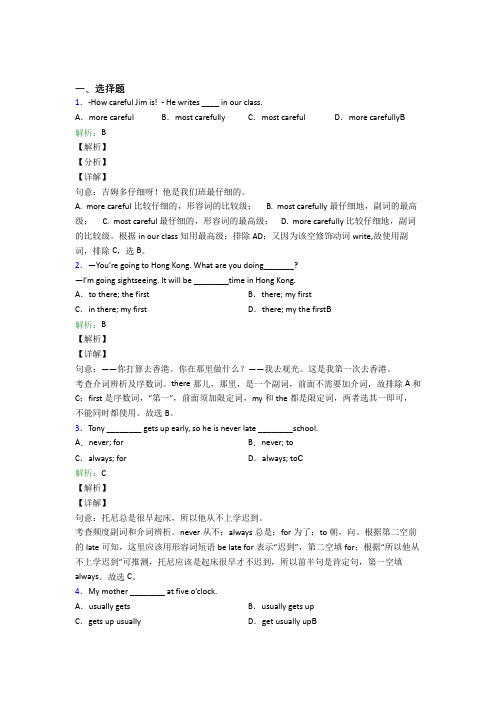
一、选择题1.-How careful Jim is! - He writes ____ in our class.A.more careful B.most carefully C.most careful D.more carefully B解析:B【解析】【分析】【详解】句意:吉姆多仔细呀!他是我们班最仔细的。
A. more careful比较仔细的,形容词的比较级;B. most carefully最仔细地,副词的最高级;C. most careful 最仔细的,形容词的最高级;D. more carefully比较仔细地,副词的比较级。
根据in our class知用最高级;排除AD;又因为该空修饰动词write,故使用副词,排除C,选B。
2.—You’re going to Hong Kong. What are you doing_______?—I’m going sightseeing. It will be ________time in Hong Kong.A.to there; the first B.there; my firstC.in there; my first D.there; my the first B解析:B【解析】【详解】句意:——你打算去香港。
你在那里做什么?——我去观光。
这是我第一次去香港。
考查介词辨析及序数词。
there那儿,那里,是一个副词,前面不需要加介词,故排除A和C;first是序数词,“第一”,前面须加限定词,my和the都是限定词,两者选其一即可,不能同时都使用。
故选B。
3.Tony ________ gets up early, so he is never late ________school.A.never; for B.never; toC.always; for D.always; to C解析:C【解析】【详解】句意:托尼总是很早起床,所以他从不上学迟到。
2020-2021学年人教版初中英语七年级下册语法综合训练习题(含答案)
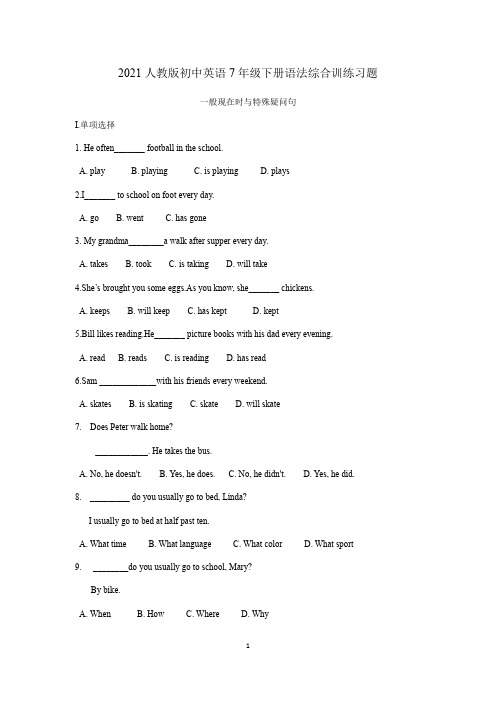
2021人教版初中英语7年级下册语法综合训练习题一般现在时与特殊疑问句I.单项选择1. He often_______ football in the school.A. playB. playingC. is playingD. plays2.I_______ to school on foot every day.A. goB. wentC. has gone3. My grandma________a walk after supper every day.A. takesB. tookC. is takingD. will take4.She’s brought you some eggs.As you know, she_______ chickens.A. keepsB. will keepC. has keptD. kept5.Bill likes reading.He_______ picture books with his dad every evening.A. readB. readsC. is readingD. has read6.Sam _____________with his friends every weekend.A. skatesB. is skatingC. skateD. will skate7.---Does Peter walk home?----____________. He takes the bus.A. No, he doesn't.B. Yes, he does.C. No, he didn't.D. Yes, he did.8.---_________ do you usually go to bed, Linda?---- I usually go to bed at half past ten.A. What timeB. What languageC. What colorD. What sport9.----________do you usually go to school, Mary?----By bike.A. WhenB. HowC. WhereD. Why10.---_______ does it take you to go to the park by taxi?-----About 30 minutes.A. HowB. How farC. How longD. How manyII.用括号中所给词的适当形式填空,必要时可加上助动词。
- 1、下载文档前请自行甄别文档内容的完整性,平台不提供额外的编辑、内容补充、找答案等附加服务。
- 2、"仅部分预览"的文档,不可在线预览部分如存在完整性等问题,可反馈申请退款(可完整预览的文档不适用该条件!)。
- 3、如文档侵犯您的权益,请联系客服反馈,我们会尽快为您处理(人工客服工作时间:9:00-18:30)。
英语学习资料1think about ,think of ,think over .这三个词组都是与“想”有关,但所表达的含义有所不同。
(1)think of :多用来指“想起,认为”。
例:Last night ,before I went to bed, I thought of my parents .昨晚我睡觉前,想起了我的父母。
(2)Think about : 多用来指“考虑某事或对某事进行思考”。
例:Before you answer this question ,please think it over .在回答这个问题之前,请认真考虑一下。
2 *stop doing 停止做某事/ stop to dostop doing , 停止做某事。
.. I must stop smoking .我必须戒烟了。
. They stop to smoke a cigarette(烟).他们停下来,抽了支烟。
3 *remember to do sth /remember doing sth .remember to do sth ,记着去做某事。
. Remember to go to the post office after school .记着放学后去趟邮局。
remember doing sth ,记着做过某事。
.Don't you remember seeing the man before ?难道你不记得以前见过那个人吗?4 * forget to do sth /forget doing sth .forget to do sth,忘记去做某事。
.The light in the office is still on ,He forgot to turn it off .办公室的灯还亮着,他忘记关灯了。
forget doing sth ,忘记做过某事。
.He forgot turning the light off .他忘记他已经关灯了。
5* regret doing 对做过的事遗憾,后悔/regret to do 对要做的事遗憾I regret to have to do this,but I have no choice.我很遗憾必须这样去做,但我实在没有办法。
I don’t regret telling her what I thought .我不为告诉她我的想法而后悔。
*try to do sth 努力,企图做某事./try doing sth .试着做某事。
You must try to be more careful .你可要多加小心了。
I tried gardening but didn’t succeed .我试着种果木花卉,但未成功。
6 *in front of在···的前面(在范围之外的前面)/in the front of在···的前面(在范围内的前面)There is a tree in front of the classroom .教室前面有一棵树。
The teacher is standing in the frond of the classroom .老师站在教室的前面。
7 定冠词the的用法1 定冠词用于表示世界上独一无二的事物或用于自然界现象或方位名词之前。
如:the sun the sky2 定冠词与单数名词连用,表示一类人或物。
如; The cat is an animal .猫是一种动物。
3 定冠词与某些形容词连用,是形容词名词化,表示某一类人。
如:the poor 穷人the rich 富人4用在序数词,形容词最高级和表示方位的名词之前。
5 定冠词用在姓名复数之前,表示一家人。
The Greens is very kind of us .格林一家带我们很好。
8 Play与球类名词连用时,名词前一般不加定冠词the;但与乐器名词连用时,名词前一般加定冠词the。
如:piay tennis打网球; play the piano弹钢琴9 few与a fewfew后面跟可数名词的复数形式。
其中a few 表示肯定,意为“一些,几个”;few表示否定,意为“很少的,几乎没有”如:I have a few good friends.我有几个好朋友。
Very few students ride bikes to school in America..在美国,很少有学生骑自行车上学。
little与a little.little与a little修饰不可数名词,其中little表示几乎没有,是否定;a little表示很少,但有,表示肯定10 love 爱,喜爱。
如果表示经常性的、习惯性的喜欢用love doing sth .,如果表示特定的或具体某一次的喜欢则用love to do sth. Love喜爱的程度比like 深。
类似的结构有like/engoy doing sth “喜欢做某事”。
11 On the wall 表示在墙的表面in the wall 表示在墙的内部如:There is a picture on the wall .墙上有一幅画。
There is a window in the wall. 墙上有一扇窗户。
12 Get sb. to do sth 使某人做某事如:He wants to get his sister to help him with the housework .他想让姐姐帮他做家务。
13 use…for /to…意思为“用……做……”。
For后面常接名词或动名词,而to 后接动词原形。
如:--What do we use it for ?--We use it to keep pencils, rulers, erasers and so on .我们用它来放铅笔、尺子、橡皮等。
We use this room for having meeting. 我们用这个房间开会。
14 to one’s surprise “使某人惊奇的是……”。
如:To my surprise ,he can speak English so well .使我惊奇的是,他英语说得那么好。
15 It one’s turn to do sth . 轮到某人做某事如:It’s your turn to clean the room .该轮到你打扫教室了。
16 with one’s help ,在某人的帮助下。
help sth , 帮助某人做某事。
如:With the doctors’help ,the boy could walk again . 在医生们的帮助下,这个男孩又能走路了。
如:They are busy helping the farmers harvest the rice . 他们正忙着帮农民收割稻谷。
17 each of ,each one of , every one of 后街复数名词或代词,当它们作主语时,谓语动词通常用单数。
如:Every one of them is going to plant trees .他们每个人都打算去植树。
18 在英语中,某些动词,如:go ,come ,leave , start , arrive , meet , fly等,可用现在进行时表示按计划或安排要发生的事。
如:He is leaving for Canada next Mondy .他下个星期一去加拿大。
19 Had better 的否定形式Had better not如:You’d better not go to Fuzhou by train .你最好不要坐火车去福州。
Don’t go across the street . 不要横穿马路。
They are going through the forest .他们正穿过树林。
20 arrive in +大范围、arrive at + 小范围,意思“到达”与arrive同意表示“到达”并可互相替换的动词还有reach 和get to .I arrive at the bank . 我到了银行。
I arrive in Beijing . 我到了北京。
(1) reach是及物动词,后面直接接地点。
如:They reached London yesterday afternoon . 他们昨天下午抵达伦敦。
(2)get to为动词短语后跟地点,如果get to 后跟的是地点副词,则可省略to ,多用于口语。
如:We got to school at 7:30 .They got home /here /there last night .(注意):reach 与get to 表示“到达”是后面必须带表示地点的名词或副词等,而arrive则可以不带。
如:I’ll call you when he arrive . 他到达时我会给你打电话。
21 It’s time for sth 到……的时间了,It’s time to do sth做什么事的时间到了It’s time for sb. To do sth 某人做某事的时间到了It’s time for school .到上学的时间了。
It’s time to go to school .上学的时间到了。
It’s time for him to go school. 他上学的时间到了。
22 On weekdays 在平日,在工作日。
这是习惯用法其中介词on 不可改用at. 但weekend(s)前可用on,也可用at ,意为“在周末”。
23 Borrow lend keepBorrow 向某人借东西,习惯上用borrow sth from sb.或borrow one’s sth.Lend 借给(把东西借给别人),习惯上用lend sb. 也可以用lend sb. Sth..Keep 表示借某物多久。
习惯上用keep sth. for + 时间段。
Put on 穿上,戴上,be in …,wear 强调穿戴这一状态My sister is in a red skirt .He often wears a jacket ,but today he is wearing a shit .Please put on your coat .24 at the back of …在……(内部)的后面25 because 不可与so 连用错:Because her mother is ill ,so she has to stay at hone .对: She has to stay at hime because her mother is ill .26 also ,too ,either , as wellalso 是正式用语,通常用于肯定句中,用于实义动词前,be动词、情态动词、助动词后。
